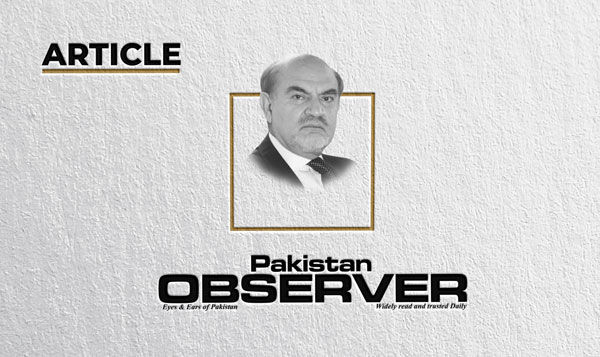Politico-religious extremism in Pakistan & beyond
DEMOCRACIES require compromises and concessions to succeed, however, a few countries face political polarization as deep as Pakistan, where each side fears the other will destroy the nation if they attain power.
Voters have been divided into diametrically opposed camps by demagogue leaders, partisanship is equated with patriotism, the opposition is considered evil, while grabbing and clinging to power, through any means, is the ultimate goal.
This is deeply hurting the economy, encouraging intolerance in the society, transforming politics into a zero-sum game and demonizing democracy.
This is exactly how democracies fall apart, as witnessed thrice in Pakistan in 1958, 1977, and 1999.
In 1971, we lost East Pakistan as a direct consequence of this phenomenon, exploited by our traditional nemesis.
Though the term extremism primarily denotes religious bigotry and fanaticism in Pakistan, it has many similarities with political immoderation, and sometimes they complement each other for mutual benefits.
Both represent ideologies that could be considered far outside the middle-of-the-road attitudes.
While the pitfalls of the former are well known and dreaded, risks of the latter are glossed over.
Consider the political events from April 2022, onwards, which reflect most norms alluded above, including perilous attempts to discredit and defame national institutions for the change of government, rather than appraising and learning from political inadequacies or governance flaws.
Because of perfidious sedition attempts to divide and subvert security forces, our national unity and cohesion was challenged like never before.
Perhaps, these events prompted the US President to assert that Pakistan “…. may be one of the most dangerous nations in the world (with) nuclear weapons, without any cohesion.
” But mercifully, our institutions have stood the arduous test of the time, so far. However extreme politico-religious outlooks still prevail which is causing uncertainty, scaring investors, providing further space to religious extremists and terrorists, causing dispersion of scarce resources and dividing attention to manage the twin dangers effectively.
So how best can this dilemma be addressed? According to research in the West, one panacea may be holding extensive public debates among opposing groups to rationalize their beliefs, bearing in mind, the views and interests of other people, the society, the state and the country.
Challenging extreme opinions in this manner could help moderate attitudes, reducing illusions, fostering willingness to explore opposing views and to compromise.
However, promoting productive discourse through this approach must be guided through individual and institutional counselling of main stakeholders, to overcome psychological tendencies of supporting fixated attitudes and affiliations with people with biased inclinations and assumptions.
Additionally, balanced and experienced members of the same politico-religious groups must stand courageously and vociferously against polarizing and hateful language, sermons and actions, to alter partisan perceptions within their own ‘clans’.
Most significantly, voters and election offices must emphasize action on promises made in political manifestoes, which are a published declaration of the intentions of political parties and serve as a benchmark for the choice of voting, as the masses usually decide which party best aligns with their expectations and aspirations by comparing these.
But they must also understand that while promises of ‘resilient’ ‘ more prosperous’, ‘new country’ or ‘real independence’ are appealing and easy to fathom jargons in manifestoes, they are mostly empty, ambiguous and intangible claims which are usually not implementable .
Politicians choose such pledges as they are easily condoned and forgotten by gullible crowds, when not fulfilled and for striking a pose rather than an honest deal.
However, manifestoes create a moral obligation for parties to keep all promises made with the people, ensuring that they concomitantly protect and promote the best interests of the country.
This matter also raises three questions which need to be answered: If a voter has voted on the basis of manifesto promises, should s/he not have the legitimate expectation that those voted to power or aspiring for it, continue to explain how those pledges are or will be fulfilled, rather than shifting or avoiding blames for this responsibility, or stressing peripheral issues?
Should people be not entitled to make leaders accountable for their failure to honour the very basis of their own vote?
Why shouldn’t judicial options for ensuring compliance of manifestoes be considered by civil society, for culpability of leaders, since manifestoes are documents of a contractual nature between them and the people who voted for them?
Unfortunately, the masses are so duped by political rhetoric that they overlook these features.
Political parties ignore them too, as there is no enforcement law, mechanism or parameters about them in election regulations.
The other category of extremist religious leaders and their followers, who combat the state through terrorism, including nurturing of suicide bombing, for their politico-religious ambitions are actually heretics, when viewed in the light of Quranic injunctions that forbid suicide (4:29-30); emphasizes preaching with wisdom, along with’ best and gracious arguments’: (16:125); declares Muslims as ‘… an Ummah justly balanced ( 2:143) and ordains obedience of the Allah Almighty, the Prophet (PBUH) ,‘…. and those charged with authority’ …( 4:59).
Such people too could be mainstreamed through the debate referred above, with learned Islamic scholars, about the former’s (mis)interpretation of religion.
In this context, anauthentic decree, titled ‘Paigham-e-Pakistan’, prepared by International Islamic University Islamabad and endorsed by Muftis and religious scholars of all schools of thought, is a worthwhile reference.
As political and religious extremism are equally hazardous spectres for the country, both need urgent, serious and collective management.
Perhaps one could end when politicians rise to levels of statesmen and the other may shrink, through sustained politico-military efforts and means, to induce religious leaders to prefer the ballot over bullet, to achieve their objectives.
But if all efforts fail, the ‘principles of democracy and tolerance’ stipulated in the Objectives Resolution of the Constitution, would have been gravely violated.
I leave it to the reader to choose, how state institutions can intervene in such environment, if at all.
—The writer is the former President of the NDU.










